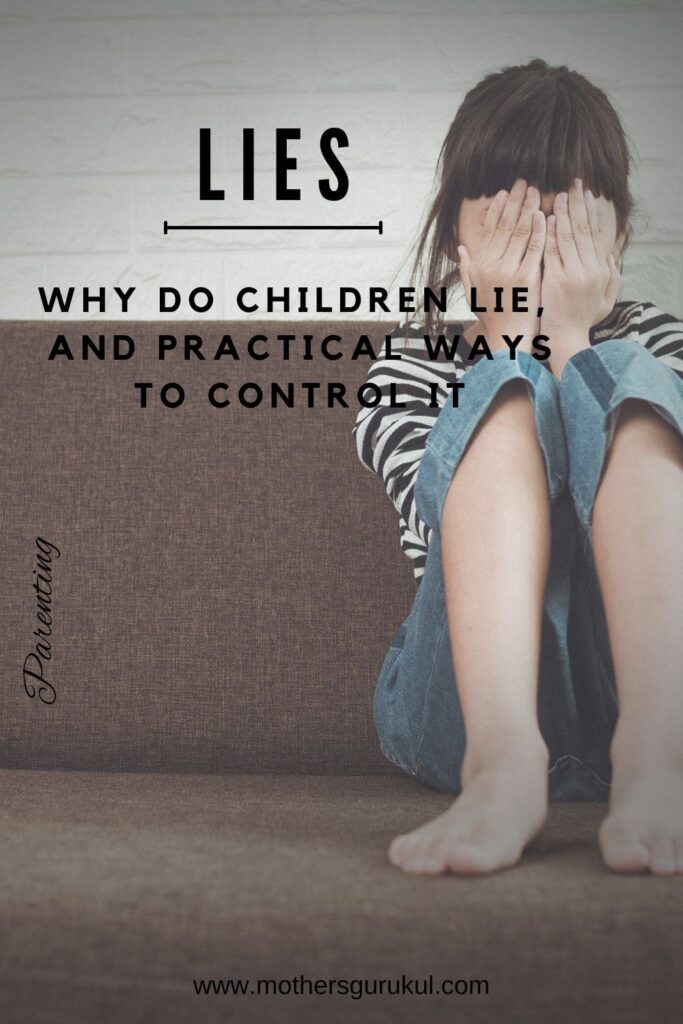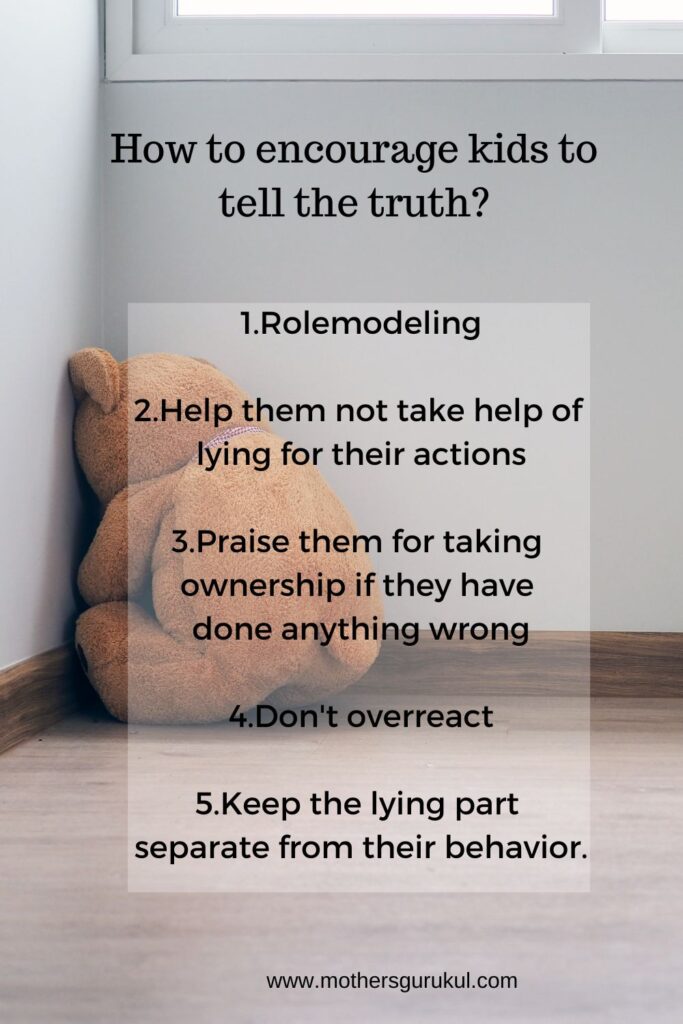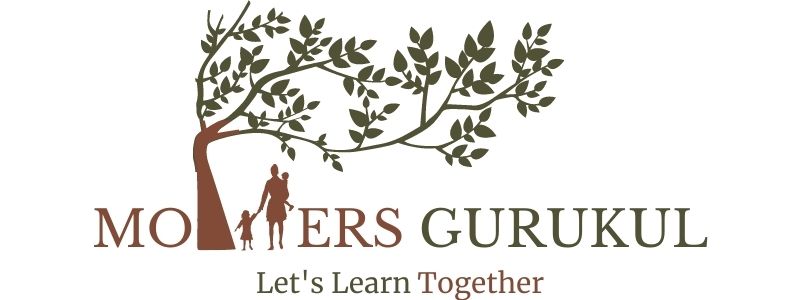Children typically begin lying in preschool ages during 3-4 ages. Initially, lying start humorously. For example, picturize a face of a child with a mouth covered with ice cream, and they are trying to wipe it off while telling us that they haven’t eaten anything. I am sure it must have brought a smile to your face. This shows they want to save themselves because they think about our reaction. But they haven’t learned the sophisticated way. But seeing it from their developmental point of view shows that our child understands how others feel or may react.
This explanation does not rule out the importance of teaching them good values. Off course, we don’t teach them to lie, but still, they learn that. Maybe because they think this is an easy way to save themselves. Or they must have seen their elders doing it. Or perhaps some other reasons. So, let’s start with why they lie and then move on to how we can handle it.

- They want to cover up their mistakes.
- They have seen their parents doing it – “if someone asks if I am home, tell them I am not.”
- They have seen their friends doing it
- They think it is an easy way out to avoid certain situations
- To gain attention or make their words sound fancy
- To get something they want – “My mommy let me eat dessert before dinner.”
- To avoid hurting others’ feelings – we can call it a “white lie.”
Related article: Why do children lie? Normal, Compulsive, and Pathological Lying in Kids
At what age do they start to lie?
Children can start telling a lie from age 3. Once they know that you cannot spot their lie, they start with small lies. Around 4-6 years, they become wise in telling a lie and matching their facial expressions. It becomes effortless to lie as they grow older because their vocabulary grows, and they have more words to make it sound natural. Plus, now they can read people better. White lies come into the picture when they are in their adolescent stage. They care about others’ feelings, and they think it’s okay to tell a lie if it is to make others feel happy.
How to encourage them to tell the truth?
When teaching kids about behavior, role modeling always holds the first place
Once again, it’s at the top. For example, we must practice the same behavior to make children understand that lying is not good. When the foundation is strong, when they see that mom and dad are always truthful towards each other or to them, they are most likely to follow the same.
Help them not take help of lying for their actions
Kids lie when they are scared of our (parents and elders or anyone) reactions. Let’s take a very simple example of spilling milk on the table. Say you have asked your child to finish a glass of milk, but when you see it whole drink is spilled on the floor. What will be your first reaction and words? To avoid this reaction, children choose to lie and make up stories. If we stay calm and say “Looks like we have an accident here, let’s clean it up and try to be more careful next time”.
Praise them for taking ownership if they have done anything wrong
It takes a lot of courage to accept a slight mistake or even apologize to anyone. Now think about admitting that you have lied. Isn’t this something that deserves appreciation and words of praise? If your children have accepted even a tiny lie, praise them by saying you are proud of them.
If your child has done something unexpected, for example, finishing his packed lunch at school, which he usually doesn’t, don’t question them repeatedly by saying, “are you telling the truth?” Such judgmental statements make them feel bad that parents doubt their honesty.
Related article: https://mothersgurukul.com/7-pointers-to-help-parents-in-raising-a-mentally-strong-kid-2/
It is difficult to control our reaction if the lie is big. But still, we don’t have to overreact. Kids try to test our limits. So the first thing is to set the expectations. Make sure that they are clear that lying or lies are not acceptable in any case. And while giving them consequences, as parents, we should keep the lying part separate from their behavior.

If they lied about something that is not their usual behavior, your empathy and confidence toward them will help them accept it. As parents, we want them to speak to us honestly and openly. Taking help of lies is a part of their growing process.

Yes, kids lie to save themselves from admonishing. But, I believe that parents need to be role models for their children. Kids these days hear everything the parents talk and catch on to the lies the adults speak to get themselves out of a social event or anything else. Kids will naturally believe that it is okay to lie and ape them.
Kids are very smart and we have to handle them smartly.
Dear Alpana, I will take my example during my childhood. Now I am a mother and I know why I used to lie in my childhood and what exactly made me lie. I will ensure my child dont do that. I used to lie as no things me and my sister get easily from my parents, the reason was many…. 1) To much control and restrictions of parents to do this and do that which in turn enhanced my curiosity of knowing why not. 2) Slaps and other punishments of parents were enough to make me lie and my sister. But a stage came where I understood that this or that whatever I do I will get scolded as for our parents They are always right and we both sisters always wrong. So my young mind started accepting better tell the truth boldly and get punished . But that resulted in unknowing distance from my parents mentally although I love them and understand their point of view of being overprotective to safeguard us from all problems and to make us strong whatever situations comes in life. But I dont know how far I will succeed but I will make an effort to create a bond of trust with my son… where he knows if anything wrong done by him or if something he wishes to have , can come to me and share that. If I say NO i will explain why I am saying so and If YES why I am saying that too. I will never utter something like… DO IT AS I M YOUR MOTHER AND YOU HAVE TO LISTEN TO ME. A child to have a heart, likes and dislikes we need to respect that too.
First of all, thanks for sharing your inner feelings. I agree, some incidents leaves a deep impact on our mind. Now when you are a mother, you can try not to repeat those things which you never liked as a child. Your parents, you or some other parents, their intentions are never bad. Just the style varies. I hope this post has given you some practical tips.
Great post, Alpana! Teaching children honesty through our own actions is key. It’s important that we create a safe and understanding environment at home, where they feel comfortable telling the truth. Thanks for writing this post, it’s really helpful.
Yes, home environment plays a big role.
We did find a few lies coming our way but yes it is important to acknowledge it and remind the kids that that don’t have to lie to us in order to cover up anything.
Yes, realization and acknowledgement is very important.
Thanks for sharing this alpana. I was quite confused on how to handle and after reading the post I. Can now understand how to make kids understand.
I am glad.
This is a very sensitive topic and ofcourse important aspect too. I agree with all your points here. Role modelling is what I also prioritize as kids are great observers and imitators.
You are right.
Alpana, this is an excellent subject you’ve covered. Lying among children is so common. Love the practical tips and insights you have shared; these can give fresh perspective and tools to young parents to handle this behavior with patience, understanding, and positive communication.
Thanks Shilpa.
Positive communication is the key to handle such situations and it’s important to make the kids realise that telling lies is bad . I usually praise them or reward them if they have told me truth inspite of doing a blunder. Lovely topic,Alpana and loved all your practical suggestions.
Thanks Debi.
Parents often consider toddlers lying as a harmless thing but it can get worse with time. I agree that we’re the ones who need to own up our mistakes and set a better example in front of them. Be kind and make them understand, no punishments.
Correct.
It is important that we develop a trust with kis from early on so that they never have to lie and can share everything. I have done that with my child and so far its working.
Thats good to know.
I loved all the suggestions you have shared here to handle this situation. I know as a parent we sometimes overcorrect them .
I am glad you liked the topic